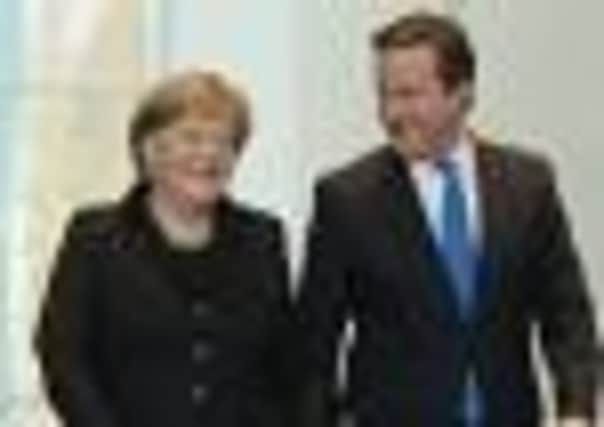No common ground in struggle to save euro


The two leaders attempted to present a united front when they pledged to work together in a spirit of “strong friendship”.
However, they left no doubt that they have not papered the cracks over Germany’s demand for treaty change to prevent a repeat of the sovereign debt crisis in the eurozone and European Commission calls for a financial transaction tax, which Britain opposes.
Advertisement
Hide AdAdvertisement
Hide AdMr Cameron said: “It is obvious that we don’t agree on every aspect of European policy, but I am clear that we can address and accommodate and deal with those differences.”
Neither the Prime Minister nor the German chancellor directly addressed the prickly issue of whether the European Central Bank (ECB) should act as a lender of last resort by printing more money to assist single currency members in economic difficulties.
However, Mr Cameron left no doubt that he remains convinced the ECB should get involved, despite German concerns that this would risk triggering inflation.
Mr Cameron said: “All the institutions of the eurozone have to stand behind and back and do what is necessary to defend it.
“It’s obviously a difficult time, we can see that in the markets, but I don’t underestimate for a minute the commitment of countries like Germany and those in the eurozone to make their currency work. That is what is in Britain’s interests and that is what we would like to see happen.”
Mrs Merkel said that Germany wants a “limited treaty change” – which she suggested would not involve countries, like Britain, which have not adopted the single currency – to ensure that eurozone members stick to their commitments under the stability and growth pact.
Germany is hoping that the upcoming summit of the European Council on 9 December will agree measures to amend EU treaties.
Mr Cameron is wary of any treaty change because he knows it will ignite backbench Conservative demands for a referendum on Britain’s relationship with the EU.
Advertisement
Hide AdAdvertisement
Hide AdThe pact, which was intended to prevent single currency members from running up unsustainable debts, has been breached more than 60 times since its introduction, said the German chancellor.
She added: “We feel it is crucial … that we develop more of a possibility of enforcing the rules of the European institutions so that national governments do abide by their commitments.
“A limited treaty change, only for the members of the eurozone, is of the essence.
“The UK has made it clear to us that they have a few difficulties here and there with certain legal provisions of the EU and also have their own ideas on how to boost competitiveness.
“We both have interests, but we also have strong bonds of friendship and these strong bonds of friendship bring us to say we will work together closely in the period leading up to 9 December because we absolutely understand each other’s viewpoints.”
Both Germany and Britain have a shared interest in an effective single market, said Mrs Merkel, adding: “The UK has a great interest, and very sensibly so, in seeing the euro area being strong.”
The two leaders said they had not closed the gap between them on imposing a so-called Tobin tax – a levy on financial transactions in EU countries.
Mrs Merkel said: “We are at one saying that a global financial transaction tax would be implemented by both countries immediately.
Advertisement
Hide AdAdvertisement
Hide Ad“But just a European one, we did not make any progress. We have to both work on where we feel change is needed.”
Mr Cameron said: “The danger, we have always believed, is driving transactions to a jurisdiction where it wouldn’t be applied. So a global tax would be a good thing, but in Britain also we have put in place stamp duty on share transactions, a bank levy.
“We believe we are asking the financial services to make a fair and proper contribution to rebuilding our economy, to bring down out debts and our deficits,” the Prime Minister added. “I think it is right in all countries to make sure that they do that.”
The leaders stressed areas of agreement over measures to improve competitiveness in European economies, hold down the EU budget and encourage member states to deal with their debts and deficits.